- Home
- David Sedaris
Let's Explore Diabetes With Owls Page 10
Let's Explore Diabetes With Owls Read online
Page 10
At the end of our train car was a little room, no more than a broom closet, really, with a barred window in it. It must have been four a.m. when two disheveled Germans stepped out, and we moved in to take their place. As would later happen with Johnny Ryan, Bashir and I sat on the floor, the state of which clearly disgusted him. Apart from the fact that we were sober, and were pressed so close that our shoulders touched, the biggest difference was that our attraction was mutual. The moment came when we should have kissed—you could practically hear the surging strings—but I was too shy to make the first move, and so, I guess, was he. Still I could feel this thing between us, not just lust but a kind of immediate love, the sort that, like instant oatmeal, can be realized in a matter of minutes and is just as nutritious as the real thing. We’ll kiss…now, I kept thinking. Then, Okay…now. And on it went, more torturous by the second.
The sun was rising as we reached his destination, the houses and church spires of this strange city—a city I could make my own—silhouetted against the weak morning sky. “And so?” he asked.
I don’t remember my excuse, but it all came down to cowardice. For what, really, did I have to return to? A job pushing a wheelbarrow on Raleigh construction sites? A dumpy one-bedroom next to the IHOP?
Bashir got off with his three big suitcases and became a perennial lump in my throat, one that rises whenever I hear the word “Lebanon” or see its jittery outline on the evening news. Is that where you went back to? I wonder. Do I ever cross your mind? Are you even still alive?
Given the short amount of time we spent together, it’s silly how often, and how tenderly, I think of him. All the way to Penn Station, hungover from my night with Johnny Ryan, I wondered what might have happened had I taken Bashir up on his offer. I imagined our apartment overlooking a square: the burbling fountain, the drawings of dams and bridges piled neatly on the desk.
When you’re young it’s easy to believe that such an opportunity will come again, maybe even a better one. Instead of a Lebanese guy in Italy it might be a Nigerian one in Belgium, or maybe a Pole in Turkey. You tell yourself that if you traveled alone to Europe this summer, you could surely do the same thing next year, and the year after that. Of course you don’t, though, and the next thing you know you’re an aging, unemployed elf so desperate for love you spend your evening mooning over a straight alcoholic.
The closer we got to New York, the more miserable I became. Then I thought of this guy my friend Lily and I had borrowed a ladder from a few months earlier, someone named Hugh. I’d never really trusted people who went directly from one relationship to the next, so after my train pulled into Penn Station, and after I’d taken the subway home, I’d wait a few hours, or maybe even a full day, before dialing his number and asking if he’d like to hear a joke.
Author, Author
If anything should be bracketed by matching bookends, I suppose it’s an author tour. The ones I’d undertaken in the past had begun in one independent or chain store, and ended, a month or so later, in another. The landscape, though, has changed since then, and it’s telling that on my ’08 tour I started and finished at a Costco.
The first one I went to was in Winston-Salem, North Carolina. I was spending the weekend with my sister Lisa, gearing up for six weeks of travel, when her husband, Bob, expressed a need for lightbulbs. “Anyone game for a quick ride to Costco?” he asked, and before he could even find his keys I was panting, doglike, beside the front door.
Living in cities, it’s easy to avoid the big-box superstores. Their merciless lighting, their stench of rubber and cheap molded plastic—it’s not the way I normally like to shop. At Costco, though, I’d found these displays of pain relievers: Anacin, Bayer, Tylenol—eight major brands were represented. Pills were paired into single-serving envelopes, then stapled in rows to a bright sheet of poster board. It looked like something you’d see behind the counter at a gas station. There the packets might cost two dollars each, but here the entire display—maybe a hundred and fifty doses—went for just twelve bucks.
At home I’d buy a bottle of Bufferin or ibuprofen and leave it at that, but when I’m on tour it’s packets I need—not for myself but to give as gifts to the people who’ve come to see me. Say it’s someone’s birthday or anniversary: I always offer the shampoos and conditioners taken from my hotels. But they provide only so many, and with a good-size crowd you’re empty-handed before you know it.
Adults get something for special occasions, but the bulk of my presents go to teenagers, who qualify by virtue of their very existence. Real fun is right at their fingertips, but instead of taking bong hits in a stolen car or getting pregnant in a neighbor’s toolshed, they’ve come to a bookstore to hear a middle-aged man read out loud. And for that they deserve a token of my gratitude. The beauty of pain relievers is that they’re light and easy to pack. On top of that, they’re actually useful. “Here you are,” I’ll say to a sixteen-year-old. “Put this in your purse or glove compartment and think of me the next time you get a hangover.”
In ’08, my gifts were pretty paltry. I’d bought eight dozen safety pins in Greece, and while they were foreign, they didn’t look much different from what you could get in the States. Ditto the German Band-Aids. So when Bob mentioned Costco I felt that all my problems had been solved.
As with every big-box store in Winston-Salem, it took fifteen minutes to drive there and another fifteen minutes to cross the parking lot. If the building seemed large from the outside, inside it was twice as big, the kind of space that has its own weather. The carts, too were slightly oversize, and made me appear even smaller than I actually am. Pushing one toward the hardware section, my brother-in-law and I looked like a pair of twelve-year-olds, the sort with that disease that speeds up the aging process and leaves them wizened and tragic.
This store didn’t have the lightbulbs Bob wanted, so we trudged on to the drug section, which proved equally disappointing. Pain relievers were in ten-gallon jars rather than packets, so I looked around for another gift that a teenager might appreciate. I wanted something light and individually wrapped, and settled, finally, upon a mess of condoms, which came in a box the size of a cinder block. It was a lot of protection but not a lot of weight, and I liked that. “All right,” I said to Bob. “I think these should do the trick.”
Putting them in the cart, I thought nothing of it, but a moment later, walking down the aisle with my fifty-nine-year-old brother-in-law, I started feeling patently, almost titanically gay. Maybe I was imagining things, but it seemed as if people were staring at us—people in families, mostly, led by thrifty and disapproving parents who looked at what we were buying and narrowed their eyes in judgment. You homosexuals, their faces seemed to say. Is that all you ever think about?
My brother-in-law is around my height, with thick, graying hair, a matching mustache, and squarish wire-rimmed glasses. I’d never imagined him as gay, much less as my boyfriend, but now I couldn’t stop. “We’ve got to get something else in this cart,” I told him.
Bob disappeared into the acreage reserved for produce and returned a minute later with a four-pound box of strawberries. This somehow made us look even gayer. “After anal sex, we like shortcake!” read the cartoon bubble now floating over our heads.
“Something else,” I said. “We’ve got to get something else.”
Bob, oblivious, looked up at the rafters and thought for a moment. “I guess I could use some olive oil.”
“Forget it,” I told him, my voice a bark. “Let’s just pay up and go. Can we do that, please?”
I’d later wonder what the TSA inspectors must have thought. My tour began and every few days, upon arriving in some new city, I’d find a slip of paper in my suitcase, the kind they throw in after going through all your stuff. Five dress shirts, three pairs of pants, underwear, a Dopp kit full of Band-Aids and safety pins, two neckties, and several hundred rubbers—what sort of person does the mind cobble together from these ingredients?
As the weeks p
assed, my suitcase grew more and more conventional. “I’ve got something for you,” I’d say to a teenager. “It’s nothing huge, just a little something to show I care.”
The kids who went to good schools would roll their eyes. “I can get those in the health room,” they’d tell me.
And, in the voice of a person whose upbringing was so fundamentally different that he might as well have been raised by camel herders, I would say, “Really? For free?”
Unlike a lot of authors I know, I enjoy my book tours—love them, as a matter of fact. That said, I’m in a fortunate position, and have been able to eliminate the parts that don’t agree with me—the picture-taking, for instance. People all have cameras on their cell phones now, and, figuring, I guess, that they might as well aim them at something, they’d ask me to stand and pose a good thirty times a night. This wasn’t an inconvenience so much as an embarrassment. “You can do better than me,” I’d tell them. And when they insisted that they really couldn’t, I’d feel even worse. Thus, at readings, there’s now a notice propped atop my book-signing table. “Sorry,” it announces, “but we don’t allow photos.” This makes it sound like it’s the store’s idea, a standard policy, like no eating fudge in the fine-arts section.
“If it’s their rule, I guess I’ll have to go along with it,” I tell people, sighing as if I were really disappointed.
With the picture-taking out of the way, I’m completely free to enjoy myself, which I generally do—and immensely. Every night, after a reading and a short question-and-answer session, I’ll sit and talk to hundreds of strangers. This fellow, for instance, whom I met in Toronto—I liked his glasses, and, after I asked where he had gotten them, we fell into the topic of corrective surgery. “I hear that you have to remain conscious during the procedure,” he told me, “and that when the laser hits its target, you can actually smell your own eyeball sizzling.”
I thought about this for days, just as I thought of the special-ed teacher I met in Pittsburgh. “You know,” I said, “I hear those words and automatically think, Handicapped, or, Learning disabled. But aren’t a lot of your students just assholes?”
“You got it,” she said. Then she told me about a kid—last day of class—who wrote on the blackboard, “Mrs. J_____ is a cock master.”
I was impressed because I’d never heard that term before. She was impressed because the boy had spelled it correctly.
For hours each night I would talk to people, asking pretty much whatever I wanted. The trick, of course, is to match the right person with the right question. Take this young woman I met in Boston a few years back. I’d been signing for almost six hours, and when she finally stepped up to the table, my mind went blank. “When, um…when did you last touch a monkey?” I asked.
I expected “Never” or “It’s been years,” but instead she took a step back, saying, “Oh, can you smell it on me?”
The young woman’s name was Jennifer, and it turned out that she worked for Helping Hands, an organization that trains monkeys to toil as slaves for paralyzed people. At her invitation, I visited the facility outside Boston and spent a pleasant afternoon having my pockets picked by some of the cleverer students.
On that tour, my questions were pretty standard: “What was the last reading you attended?” “Who are you going to use this condom on?” “If you stepped out of the shower and saw a leprechaun standing at the base of your toilet, would you scream, or would you innately understand that he meant you no harm?”
Late at night I’d return to my room, scoop up the shampoos and conditioners replaced as part of the turndown service, and record everything that I had learned, not just the stories that people had told me but all the ephemera: The names of local restaurants and hair salons seen from the car window. One hotel with its Martini Tuesdays, another with its Fajita Fridays. In Baton Rouge, a woman asked me to name her donkey. “Stephanie,” I said, and later that night, too tired to sleep, I lay awake and wondered if I’d spoken too quickly.
In 2004, I offered priority signing to smokers, the reason being that, because they didn’t have as long to live, their time was more valuable. Four years later my special treatment was reserved for men who stood five-foot-six and under. “That’s right, my little friends,” I announced. “There’ll be no waiting in line for you.” It seemed unfair to restrict myself to men, so I included any woman with braces on her teeth.
“What about us?” asked the pregnant and the lame. And because it was my show, I told them to wait their fucking turn.
After a month in the United States, I flew to Canada to finish my tour. On my first night in Toronto, I read at a chain store called Indigo. That event ended at midnight, and the next afternoon, following a half dozen radio and print interviews, I was taken to Costco, not to buy pain relievers and condoms but to meet my readers. Or, rather, not meet them. My appearance had been advertised by way of flyer and was to last no longer than an hour. Shoppers passed with their enormous carts, most loaded with children who gaped through the bars at this ridiculous nobody, sitting by himself at a folding table. Making it just that much more pathetic was the sign next to me, the big one reading “No Photos, Please.”
It would be my greatest pleasure not to take your picture, I imagined people thinking. I mean, really, just who the hell do you think you are?
It’s a question well suited to a cavernous space. There your eyes can roam heavenward, past the signs for frozen food and automotive supplies, past the arrow pointing to the cash registers, and on to that boundless parking lot, which leads, eventually, to home.
Obama!!!!!
Our village in Normandy is too small to have its own paper, but there are several that serve the region and come out once a week. If it’s not that hard to get written up in, say, the Atlanta Journal-Constitution, it’s really, really not hard to find yourself in L’Orne Combattante. In fact, it’s hard to stay out of it.
The farmer across the road from us, Robert “Bob” Gerbenne, was profiled in the late 1990s. “The Man Who Truly Whispers to Horses,” read the headline. The picture was of him, seeming to gossip into the ear of his Percheron, a dappled mare as solid as a dump truck. Hugh’s been in the paper as well—twice, as a matter of fact. The last story was about his landscape paintings, and the one before that appeared in October 2004. They wanted to talk to an American about the presidential election, a who-do-you-hope-will-win sort of thing. The resulting article, titled something subtle like “Local Man Distrusts and Despises Bush,” was, said the Horse Whisperer, “pas mal,” meaning “not bad.”
Weeks before the 2008 election, the Combattante interviewed our friend Mary Beth, who was born and raised outside Boston and moved to our area after marrying her French husband. “Being a white American, you wouldn’t vote for a black man, would you?” the reporter asked.
Though crudely phrased, the question was fairly common, and not just in backwater Normandy. In the year before the election, I traveled pretty much nonstop: Italy, Greece, Germany, the Netherlands, Australia, Brazil, and all through the U.K. and Ireland. These were book tours, so I sat for a lot of radio and print interviews. In the U.S., unless you’ve written about politics, you don’t expect political questions. Overseas, on the other hand, it’s pretty much all you get, at least if you’re an American. I could have written a history of frosting and still they’d have asked me about Guantánamo, and my country’s refusal to sign the Kyoto Accords.
It’s not that I don’t have opinions about these things; I just don’t feel they’re in any way special. Sure, I follow the news. I read the papers and listen to the radio, but I’m not privy to any inside information. When it comes to politics, all I can offer is emotion. My perspective might be slightly different, but so is anyone’s when they live overseas.
I remember my dad calling after the Iraq war started and asking if I felt safe on the streets of Paris. He had the idea that the Europeans, and specifically the French, had become openly hostile and were targeting Americans—even throwing
bottles at them. If that was happening, I neither saw it nor read about it. In my experience, people were curious. They had plenty of questions, but I was never insulted or singled out in any way. It might have felt different were I a Bush supporter, but as it was, the president brought my neighbors and me together. It was like the Small World pavilion at Disneyland, everyone on the same page.
As the 2008 primaries began, so did the predictions. The reporters in Greece, the ones in Australia and Amsterdam and Dublin, all of them assured me that America would never elect a black president.
“Maybe,” I said, “but I’ll bet you that half of America could elect a half-black president.”
“No way,” said the German who’d once spent a week in Los Angeles, the Brazilian whose wife was from Tennessee, the Englishman who’d seen Borat four times. Everyone was an expert, and what they all knew was this: Americans are racist.
It always sounds false when white people talk about how gentle and color-blind they are. “One thing I’ve learned from my many Asian, Latino, and African American friends is that we’re all brothers under the skin.” Statements like this make me queasy, but they’re really no worse than the often heard “How could I be racist when my first boyfriend was black?”
My first boyfriend was black as well, but that doesn’t prove I’m color-blind, just that I like big butts.
If I’m walking down an American street and anyone darker than a peanut shell approaches, I’ll say, “Hello.” This because, if I don’t say it, he or she might think that I’m anxious. Which, of course, I must be, otherwise I’d walk by in silence, just as I do with my fellow Caucasians.

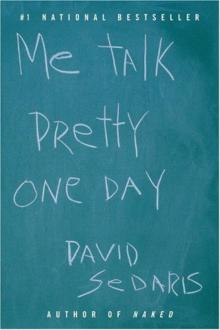 Me Talk Pretty One Day
Me Talk Pretty One Day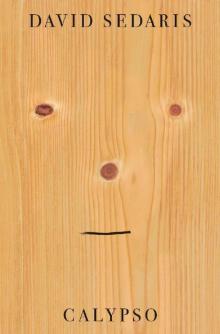 Calypso
Calypso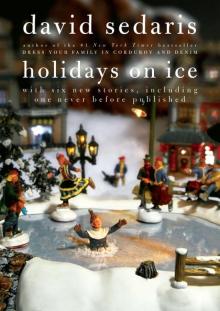 Holidays on Ice
Holidays on Ice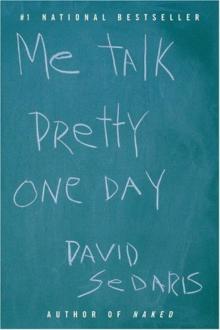 Mi vida en rose
Mi vida en rose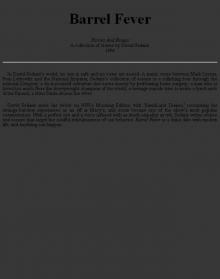 1994 - Barrel Fever
1994 - Barrel Fever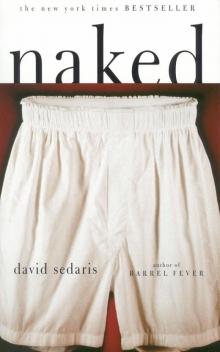 Naked
Naked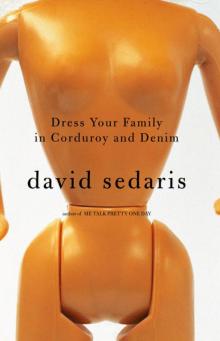 Dress Your Family in Corduroy and Denim
Dress Your Family in Corduroy and Denim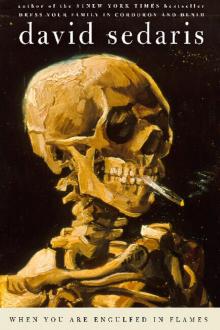 When You Are Engulfed in Flames
When You Are Engulfed in Flames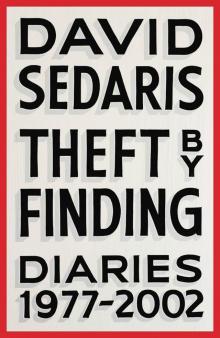 Theft by Finding: Diaries 1977-2002
Theft by Finding: Diaries 1977-2002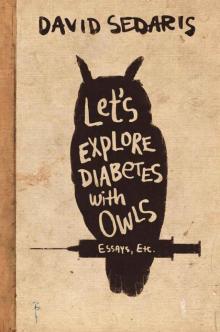 Let's Explore Diabetes With Owls
Let's Explore Diabetes With Owls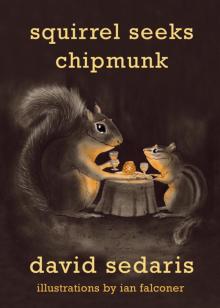 Squirrel Seeks Chipmunk: A Modest Bestiary
Squirrel Seeks Chipmunk: A Modest Bestiary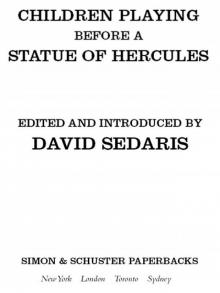 Children Playing Before a Statue of Hercules
Children Playing Before a Statue of Hercules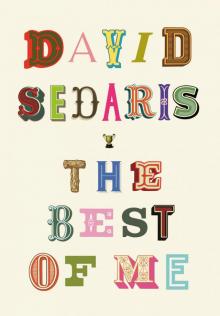 The Best of Me
The Best of Me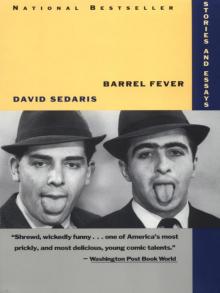 Barrel Fever
Barrel Fever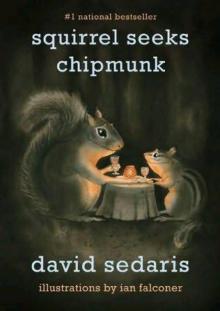 Squirrel Seeks Chipmunk
Squirrel Seeks Chipmunk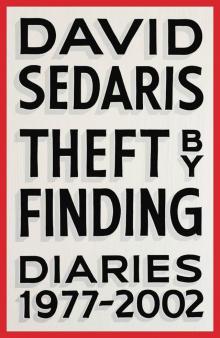 Theft by Finding
Theft by Finding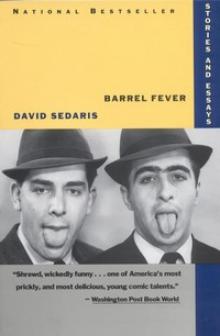 Barrel Fever and Other Stories
Barrel Fever and Other Stories